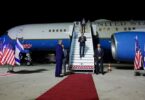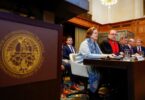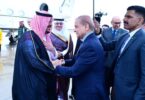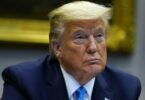WASHINGTON DC (Agencies): The hasty withdrawal of American military forces from Afghanistan and the fall of the authorities in Kabul damaged the reputation of the United States on the world stage. This was stated on Tuesday by the chairman of the Committee of Chiefs of Staff (CSC) of the US Armed Forces, General Mark Milley, speaking at a hearing in the Senate Committee on Armed Forces.
Asked if he agrees that the withdrawal of American troops from Afghanistan and the fall of Kabul have seriously damaged the US reputation in the world, the general stressed: “I think that our reputation among allies and partners around the world, as well as opponents, is them intensive analysis in order to understand in which direction everything will go.” “And I think damage is a word that can be used [in this situation]. Yes,” added Milley.
When US Secretary of Defense Lloyd Austin, who attended the hearing, was asked what signal the situation in Afghanistan is sending to Washington’s allies in NATO and around the world, not only about America’s reputation, but also about America’s resolve, he replied: “The world has witnessed American troops evacuating 124 thousand people in 17 days.” Then he was again asked about the reputation of the United States in the world. “I think our reputation remains solid. There will always be people who will doubt what will happen. But I would say that we, the United States Armed Forces, are one, people have a lot of trust in us. And the relationship – this is something we must constantly work on. And we understand that we will continue to do this, “- said the head of the Pentagon.
Milley added that the Taliban movement has not severed ties with the international group Al-Qaeda and still remains a terrorist structure.
“[The] Taliban was and remains a terrorist organization and they still have not severed ties with al-Qaeda. I have no illusions about who we are dealing with. It remains to be seen whether the Taliban can “to consolidate power, or the country will split into parts as a result of the subsequent civil war,” the military leader said.
He recalled that the previous administration reached agreements with the Taliban in Doha, within the framework of which both sides assumed a number of obligations. Thus, according to Milley, for the withdrawal of American troops the Taliban had to fulfill a number of conditions that would lead to a political agreement with the Afghan government. “Although the Taliban did not attack US troops, which was one of the conditions, they did not fully fulfill other obligations under the Doha Agreement. Perhaps most important for US national security, the Taliban never renounced al-Qaeda. “and did not break ties with her,” the head of the KNSH stressed.
He pointed to the need to “protect the American people from terrorist attacks emanating from Afghanistan,” especially from Al-Qaeda and the Islamic State extremist group. “A re-created al-Qaeda or ISIS with the intention of attacking the United States is a very real possibility, and such circumstances, including activities in uncontrolled areas [of the Islamic republic], may arise in the next 12-36 months. Now this task [to ensure the security of the United States ] will be much more difficult, but not impossible, and we will continue to protect the American people, ”said Milley.
Joint Chiefs of Staff Chairman defended contacts with his Chinese counterpart in final weeks of the Trump administration as well as his decision to call a meeting of senior military officials to review the procedures for launching deadly weapons.
Milley said in testimony before the Senate Armed Services Committee the calls were generated by “concerning intelligence” that caused Americans officials to believe the Chinese were worried about an attack on them by the U.S.
“I am certain, President Trump did not intend on attacking the Chinese and it is my directed responsibility – and it was my directed responsibility by the secretary — to convey presidential orders and intent,” Milley said in his opening remarks.
“My job at that time was to de-escalate. My message again was consistent: calm, steady, and deescalate. We are not going to attack you.”
Milley also said that, following the Jan. 8 call with his Chinese counterpart, he briefed then-Secretary of State Mike Pompeo and then-White House chief of staff Mark Meadows, in addition to Christopher Miller, who at the time was serving as acting defense secretary.
Milley also expanded on a phone call that he received from Speaker Nancy Pelosi (D-Calif.) later that same day during which she asked about Trump’s ability to launch nuclear weapons. Pelosi raised the concerns two days after throngs of Trump supporters flooded the Capitol, launching a deadly insurrection motivated by Trump’s false claims that he won the 2020 election.
“I sought to assure her that nuclear launch is governed by a very specific and deliberate process. She was concerned and made various personal references characterizing the President,” Milley told the committee members on Tuesday.
“I explained to her that the President is the sole nuclear launch authority and he doesn’t launch them alone and that I am not qualified to determine the mental health of the president of the United States,” Milley continued. “There are processes, protocols, and procedures in place and I repeatedly assured her there is no chance of an illegal, unauthorized, or accidental launch.”
Milley confirmed that he met with senior military officials in his office to “refresh” the procedures around launching nuclear weapons. Milley acknowledged that he is not in the chain of command but said the meeting was within his statutory authority as the president’s primary military adviser.
“At no time was I attempting to change or influence the process, usurp authority, or insert myself in the chain of command, but I am expected, I am required, to give my advice and ensure that the President is fully informed on military matters,” Milley told the committee.
Milley during his testimony described his loyalty to the U.S. and its Constitution “absolute” and made clear his belief that the military must steer clear of politics.
“I firmly believe in civilian control of the military as a bedrock principle essential to the health this Republic and I am committed to ensuring the military stays clear of domestic politics,” Milley told the committee.
In addition to the public explanation, Milley also submitted two unclassified memos detailing his calls with his Chinese counterpart as well as his phone call with Pelosi to the committee. He welcomed further discussion regarding the intelligence indicating the Chinese worried about a U.S. attack in a classified session with lawmakers, which is expected to follow the open session on Tuesday.
US Defense Secretary Lloyd Austin expressed the opinion that the topic of the possible use by the American side of Russian military bases in Central Asia to fight terrorism could have been raised during a conversation between Chairman of the Committee of Chiefs of Staff of the US Armed Forces Mark Milli and Chief of the General Staff of the Russian Armed Forces Valery Gerasimov.
“This is a question that I believe came up during a conversation between [US President Joe Biden] and [Russian] President Vladimir Putin, during which President Putin offered to <…> provide assistance,” the Pentagon chief argued. “But have you contacted Russia to ask specifically about the use of the bases,” one of the members of the Senate asked to clarify. “General Millie recently had a conversation with his Russian counterpart. <…> I can assure you that we are not seeking permission from Russia to do something, but I suppose, although General Milli may speak for himself, but I believe he asked for clarification as to what the proposal was, “Austin replied.






